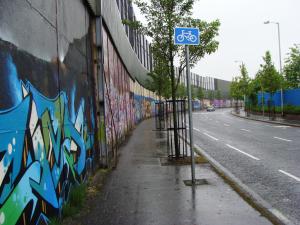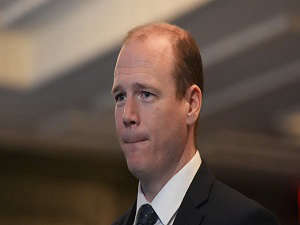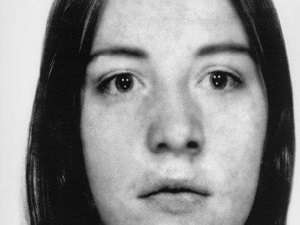
Q Radio News
The lack of devolved government in Northern Ireland is hampering efforts to transform the region's peace walls, according to the chairman of the International Fund for Ireland.
There are an estimated 116 barriers separating unionist and nationalist communities across Northern Ireland.
They are mostly located in Belfast but are also present in Londonderry as well as Co Armagh towns Lurgan and Portadown.
A small number have been removed or transformed, including one at a former flashpoint in Ardoyne, north Belfast, in 2016.
It was transformed to lower height black metal railings following agreement between the local communities.
Dr Adrian Johnston, chairman of the International Fund for Ireland (IFI) said progress on other barriers has slowed significantly in the absence of power-sharing government.
He told Press Association that at the start of 2018, there were 12 barriers they hoped to see progress on.
As the year went on he said it became clear there could have been movement on seven barriers if an aftercare strategy had been put in place by government to reassure communities who are ready for change.
In 2011, the peace wall gate in Alexandra Park in north Belfast started to be opened regularly.
Dr Johnston said those residents are now ready to make further progress but this has stalled due to the political stasis.
He also said there has been developments in other interfaces in north Belfast as well as some residents prepared to have protective metal grilles on house windows transformed.
Dr Johnston said political leadership, a strategy and the guarantee of an aftercare package to reassure communities are needed.
The Northern Ireland Assembly has been in suspension since January 2017 following a breakdown in relations between the Democratic Unionists and Sinn Fein.
"Our Peace Walls Programme has been working with interface communities since 2012," Dr Johnston said.
"We are calling for appropriate levels of support for all communities in interface areas once walls are removed or softened.
"If support isn't offered, progress in peace building may be negatively affected, which could lead to residents losing faith in the process on the ground."
The IFI also funds projects that aim to transform local communities.
Dr Johnston said the lack of political leadership has helped paramilitary organisations on both sides of Northern Ireland's divide to target young people.
He also said the ongoing uncertainty around Brexit has caused insecurity around political identity among border communities in Ireland.
On Monday, the IFI announced details of its latest funding package, pledging a £2.6m investment in 17 projects across Ireland which seek to deliver positive change.
This includes £652,828 to five projects in the Peace Walls Programme across Belfast and Londonderry.
Dr Johnston warned the fund alone cannot deliver on the scale that is needed without support.
"The most marginalised sections of our society are being further impacted by not resolving the long-term issues they continue to face as a legacy of the past," he said.
"We know that the IFI must continue to engage in communities where others aren't in order to achieve positive, lasting transformation.
"Without support from other key organisations or government, the fund alone cannot deliver on the scale that is required."


 Kneecap to headline festival two days after terror charge
Kneecap to headline festival two days after terror charge
 Gordon Lyons to attend first GAA match as Stormont Communities Minister
Gordon Lyons to attend first GAA match as Stormont Communities Minister
 Fresh appeal over 1973 murder of 18-year-old whose body was found in quarry
Fresh appeal over 1973 murder of 18-year-old whose body was found in quarry
 Kneecap say terror charge is ‘carnival of distraction’ and ‘political policing’
Kneecap say terror charge is ‘carnival of distraction’ and ‘political policing’
 Woman assaulted while jogging in West Belfast
Woman assaulted while jogging in West Belfast